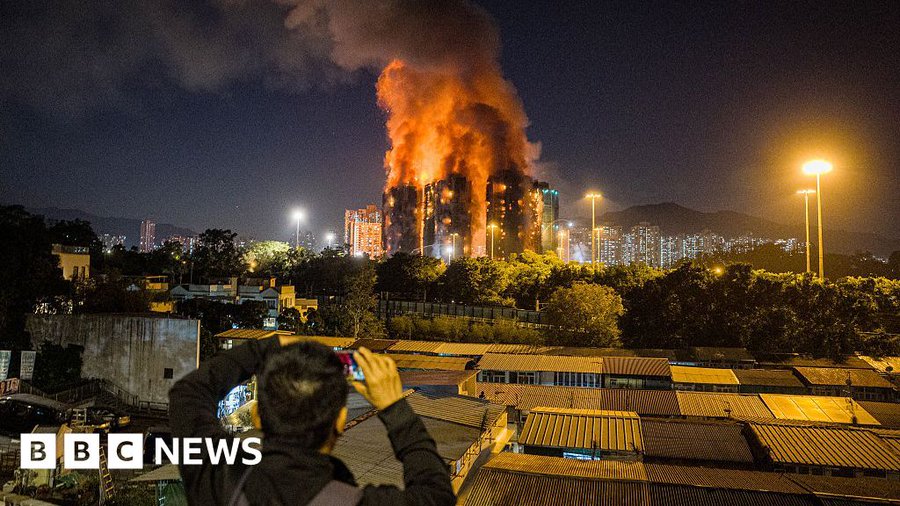
A devastating fire has ripped through several high-rise tower blocks in Hong Kong, killing at least 36 people. More than 270 have been reported missing and thousands of residents are in evacuation shelters.
Pictures show several buildings ablaze, and thick smoke billowing into the air, dominating the Chinese territory's skyline.
As night fell, the fire was still burning hours after it was first reported, with more than 760 firefighters deployed to the scene.
What caused the blaze is still unclear, but here is what we do know, so far.
Where and when did the fire start?
The blaze broke out at Wang Fuk Court, a large housing complex in Hong Kong's Tai Po district, at 14:51 local time on Wednesday (06:51 GMT).
Wang Fuk Court consists of eight tower blocks, each 31 storeys high. Seven have been affected by the fire, Tai Po district councillor Mui Siu-fung told BBC Chinese.
They provide 1,984 apartments for some 4,600 residents, according to the 2021 government census.
Built in 1983, the tower blocks were undergoing renovations, and the outside of the buildings was covered in bamboo scaffolding and construction netting. Footage shows the fire spreading quickly through the bamboo.
There have been reports by residents in some local media that fire alarms did not sound.
Tai Po is a residential district in the northern part of Hong Kong, near the city of Shenzhen on the Chinese mainland.
How serious is the fire?
The Hong Kong fire department has classified the blaze as a level five alarm - the highest in severity.
Within 40 minutes of first being reported, it was declared a level four, but by 18:22, about three and a half hours later, the level was raised again.
It has been 17 years since a level five fire last hit Hong Kong.
Local media reported that explosions could be heard inside the building and fire hoses could not easily reach the higher levels.
The ferocity of the heat was preventing firefighters from entering the buildings to conduct rescue operations, deputy director of fire services Derek Armstrong Chan told media.
"Debris and scaffolding of the affected building are falling down, posing additional danger to our front-line personnel," he said.
It was difficult, he added, to know when the fire would be fully extinguished, with residents fearing it would burn all night.
As well as 767 firefighters, 128 fire engines, 57 ambulances and some 400 police officers were deployed.
What do we know about the victims?
The death toll rose significantly early on Thursday morning, from 13 to 36 people.
Just after midnight, Hong Kong chief executive John Lee confirmed 279 people were missing.
Police officers have been helping residents search for family members by using a loudspeaker, local media reported.
At Wednesday night's news conference, the number of those injured was revised down to 15 people, after it was initially put at 28.
Among the dead is a firefighter, Ho Wai-ho, 37, who had been with the service at Sha Tin Fire Station for nine years.
The fire service says it lost contact with him at 15:30, and about half an hour later, found that he had collapsed. He was taken to hospital but declared dead shortly after.
"I am profoundly grieved at the loss of this dedicated and gallant fireman," said Andy Yeung, director of the fire service.
At least one other firefighter is in hospital, the Hong Kong fire service said.
Emergency hotline and shelters set up
Several emergency shelters have been set up to accommodate residents who were evacuated, the government said. The South China Morning Post reported that one of them - at Tung Cheong Street Sports Centre - was full, and residents were being directed to other shelters.
Another, the Kwong Fuk Community Hall, which is just over the road from the housing estate, was deemed unsafe. Evacuees were moved to another shelter, further away.
BBC Chinese reporter Gemini Cheng saw elderly residents, some using walking sticks or wheelchairs, arriving at some of the shelters. Coaches will later transfer them to community halls which will remain open overnight to accommodate those displaced by the fire.
Six schools in Tai Po will remain closed on Thursday, the Education Bureau announced, listing the affected schools on its website.
An emergency monitoring and support centre is in operation to manage the impact of the fire, security secretary Tang Ping-keung said in a statement.
A hotline for the public to ask about casualties has been set up by Hong Kong police - the number is +852 1878 999.
Hong Kong and bamboo scaffolding
The tower blocks at Wang Fuk Court are covered in bamboo scaffolding and green construction netting, right up to the rooftops, because they are undergoing renovations.
Such scaffolding has been used in Hong Kong for centuries, as bamboo grows quickly, and is lightweight and very strong. Many see it as an iconic part of the city's urban landscape but Hong Kong is one of the world's last remaining cities to use it in modern construction.
Local media reports in March said the government's development bureau had been trying to phase out the use of bamboo because of safety concerns. The push towards using metal instead of bamboo came after a spate of scaffolding-related deaths in Hong Kong.
Bamboo scaffolds have "intrinsic weaknesses such as variation in mechanical properties, deterioration over time and high combustibility, etc, giving rise to safety concerns", bureau spokesperson Terence Lam was quoted as saying.
The cause of this fire is still unclear, however authorities note that it seems to have spread quickly - and to neighbouring buildings - through the bamboo scaffolding.
















